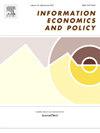Managing network traffic with discriminatory strategies: A study of zero-rating in an Internet market monopoly
IF 3.2
3区 经济学
Q1 ECONOMICS
引用次数: 0
Abstract
Zero-rating is a recent practice that allows internet providers to discriminate among content. We offer new insights on the role of zero-rating practices when there is network congestion. In a market where consumers differ in their preferences for network speed, those who value network speed more create a congestion externality for an Internet Service Provider that limits its ability to capture consumer surplus from those who value network speed less. The monopolist may internalize the network congestion by using two discriminatory strategies: a menu of tariffs as a screening mechanism between consumers and zero-rating as a content revaluation tool. The combination of the two strategies acts as a mechanism to control network traffic without incremental provisioning of capacity. This is done by managing the network flow, through the strategic reallocation of the network traffic between content providers and consumers. Finally, zero-rating is detrimental to consumers independently of their type.
以歧视性策略管理网络流量:互联网市场垄断下的零评级研究
零评级是最近的一种做法,允许互联网提供商对内容进行歧视。我们对网络拥塞时零评级做法的作用提供了新的见解。在一个消费者对网络速度偏好不同的市场中,那些更看重网络速度的人会给互联网服务提供商带来拥堵外部性,从而限制了它从那些不那么看重网络速度的人那里获取消费者剩余的能力。垄断者可能通过使用两种歧视性策略将网络拥塞内部化:一种是将关税菜单作为消费者之间的筛选机制,另一种是将零评级作为内容重估工具。这两种策略的组合可以作为一种机制来控制网络流量,而无需增加容量供应。这是通过在内容提供者和消费者之间战略性地重新分配网络流量来管理网络流来实现的。最后,零评级对不同类型的消费者都是有害的。
本文章由计算机程序翻译,如有差异,请以英文原文为准。
求助全文
约1分钟内获得全文
求助全文
来源期刊

Information Economics and Policy
ECONOMICS-
CiteScore
5.00
自引率
10.70%
发文量
27
期刊介绍:
IEP is an international journal that aims to publish peer-reviewed policy-oriented research about the production, distribution and use of information, including these subjects: the economics of the telecommunications, mass media, and other information industries, the economics of innovation and intellectual property, the role of information in economic development, and the role of information and information technology in the functioning of markets. The purpose of the journal is to provide an interdisciplinary and international forum for theoretical and empirical research that addresses the needs of other researchers, government, and professionals who are involved in the policy-making process. IEP publishes research papers, short contributions, and surveys.
 求助内容:
求助内容: 应助结果提醒方式:
应助结果提醒方式:


